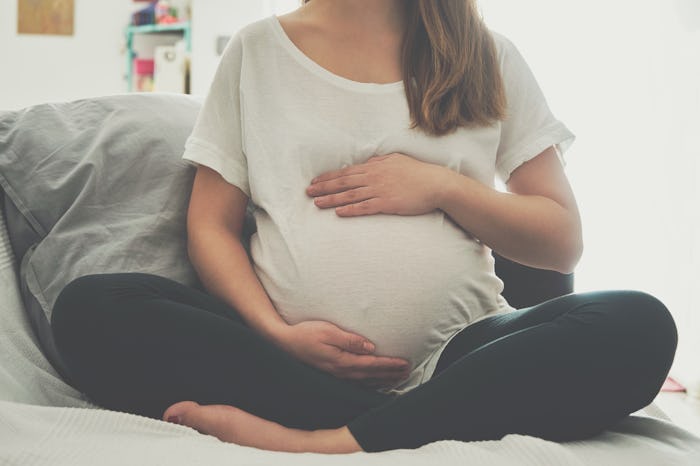Life
Stress During Pregnancy Could Impact Your Baby's Growth, New Study Finds
Everyone knows there's going to be some stress associated with pregnancy. People who are expecting a baby have a lot to be concerned with, after all — from their health, to their baby's health, to the thought of raising an actual, living human being and taking care of them for at least the next 18 years. It's not all sunshine and rainbows and baby shower games, and feelings of stress or anxiety are incredibly normal. However, new research shows that elevated stress during pregnancy can impact a baby's growth, at least according to a new study of pregnant mammals.
Research conducted at the University of New Mexico — in conjunction with the University of Göttingen and the German Primate Center — recently showed how stress can affect a baby’s growth during pregnancy and after, and the results may be a little surprising to some. The findings of the recent study suggested that babies are indeed physically impacted by their mother's stress level during pregnancy, and that that stress can result in either a slower or faster growth of a fetus and baby.
Researchers tested their predictions using a grand total of 719 studies across 21 mammal species, according to The Daily Lobo, the student newspaper at the University of New Mexico. The species ranged from rodents, to ungulates, to primates, according to documents provided to the publication by University of New Mexico evolutionary anthropologist Andres Berghänel, Ph.D. It doesn't appear that human mothers were included in this particular study, but since we are also mammals, the findings could still be significant for moms to be aware of.
The study determined that the timing of the stress has a lot to do with how it affected the growth of a baby, according to the German Primate Center at the Leibniz Institute for Primate Research. Berghänel, the lead author of the study, reportedly said of the findings:
The idea is that prenatal stress affects offspring in two different ways depending on the timing of the stressor during pregnancy – yielding different outcomes before birth, after birth, and after weaning.
For instance, prenatal maternal stress later on in gestation appears to cause mothers "to invest less energy in their unborn offspring," leading to slower "intrauterine and early postnatal" growth, the study found.
However, once those offspring reach "nutritional independence" in their lives, AKA once they aren't affected directly by their mother supplying them with food and nutrition, those babies generally grow at the same rate as "non-disadvantaged offspring." Basically, a mother's stress later on during pregnancy leads to slow growth during dependent phases, but unchanged growth later on.
By comparison, maternal stress early on in a pregnancy causes a fetus to “make the best of a bad job,” as the German Primate Center put it. The findings suggested that these "challenged offspring" transition to an accelerated pace of life where they grow and mature faster than "unchallenged offspring" that didn't deal with that stress, in order to ensure that they reproduce before they die. Yikes. No pressure there or anything.
However, once they're on the "fast track," so to speak, the offspring born under early prenatal maternal stress stay on this faster growth trajectory even after they're weaned, and tend to "overshoot" the usual body size for age throughout their development, Berghänel reported in the study, published in the Proceedings of the National Academy of Sciences of the United States of America.
Researchers reportedly wanted to figure out why there are highly variable patterns when it comes to the growth rates of "disadvantaged" mammal offspring, The Daily Lobo reported. Berghänel said of the results:
Our comparative analysis across mammals brings order to previously ambiguous results on the effects that maternal stress has on the developing offspring. Different studies, often on the same species, have reported that early adversity enhances, hampers or has no effect on offspring development and performance.
Essentially, a mother's stress during pregnancy does seem to impact the growth of a fetus and a baby's growth once it's born, for better or worse, according to this new study. Berghänel emphasized that while prenatal stress does seem to have an affect on offspring, its not "fixed for life" and the effects can be "readjusted," according to KRQE News.
Berghänel said that the study’s results might help researchers understand other aspects of growth and development in children, like why girls start their menstrual cycles earlier in impoverished neighborhoods, according to The Daily Lobo.
Even though these studies evaluated mammals like rodents and primates, scientists are extrapolating the findings to humans in hopes that they can better understand what stress during pregnancy can do to a mother and baby — and how that stress could be mitigated to help keep the pair as healthy as possible.
Check out Romper's new video series, Romper's Doula Diaries:
Watch full episodes of Romper's Doula Diaries on Facebook Watch.
